
In high school, friends and I started a Bible club at our public school. It was a place where Christians and those who were Jesus-curious could come together and discuss the relevance of the Bible and of a relationship with God. We called it “Academic Bible Club” which helped us overcome objections from the administration about permitting an obvious religious group meet at the school. The school was very hostile to any attempts my friends and I made to influence students and teachers with the message of Jesus. We adhered to the law, however, and they had to capitulate.
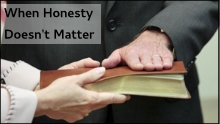
Placing one’s hand upon a Bible before taking an oath used to be a standard in so many American traditions. While we still do so for some of the highest offices in the land (President, for instance, and supreme court justice), but it has largely fallen by the wayside as the nation has tried to become more accommodating to other religious or non-religious peoples. In court we’ve moved on from placing a hand on the Bible to raising our right hand, and from all the corruption among politicians and lawyers I can’t say its an improvement.
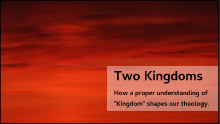
Last week we learned that there is more than one kingdom that Jesus talks about in the Gospels. Matthew discusses the Kingdom of Heaven, different from the Kingdom of God used by other gospel writers. The Kingdom of Heaven has traitors in its midst, while the Kingdom of God exists after the wheat and the chaff have been separated. How does this understanding of the two Kingdoms impact our theology? It has to do with a phrase that you may have come across in other readings, “now, and not yet” talking about the duality of the Kingdom.
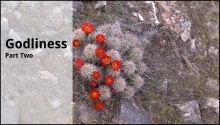
Last week news broke that Bill O’Reilly was leaving the Fox News channel, shocking news to everyone concerned. Rumors swirled, some news outlets reporting that O’Reilly was fired due to a sexual harassment suite, others that advertisers began pulling from the show due to that harassment suite. Some reveled in the notion that the conservative commentator wasn’t as straight an arrow as he claimed to be, others simply could not believe that the accusations against him were true. Where the truth lies we’ll likely never know as usually cases like this end up with a settlement and a court gag order.

It’s a word that Apple used first and other tech companies started picking up on. Watch any of the past Microsoft events, or Google’s IO conference and count how many times you hear the word “re-imagine” or any of its variants. Apple “re-imagined” the phone and then every other product category they entered, Microsoft “reimagined” the tablet, then Windows itself and Google has re-imagined the Android OS, intelligent devices and autonomous cars. I’m uncertain as to their correct usage of the term, but it leads me to ask a question of my own: What if we re-imagined our relationship with God?
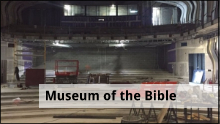
This marks the start of a prolonged series on the Gospel of Luke. As we’ve already examined the book of Acts, it seems reasonable that the first Gospel we study should be Luke as both share a common author. Ask anyone to compare the gospels and two facts will almost always be mentioned: (1) that John is the Gospel of Love, and (2) that Luke is the Historical Gospel. While it is true that John gives us a look into Jesus’ personal struggles and relates stories not contained in any other gospel account, it is not true that Luke is purely a historical account.
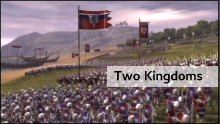
Upon occasion Think-Biblically.com receives comments from its readers. Most are of a positive nature and warm our heart by indicating how meaningful a particular article has been or that text from a blog has been used at a wedding or funeral service. These are always welcome and we would encourage you to send in those stories. We do not publish these messages as they are usually of a personal nature and the author rarely grants us permission to do so in the text itself. There are, of course, some that are critical and those with merit we address privately.
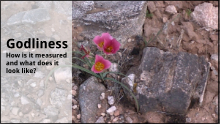
At a public debate among those running for Student Body President one candidate attempted to make “Unity” his platform, saying at one point, “Our student body needs more unity.” A quick-witted reporter for the campus newspaper asked an insightful question, “How much do we have now? And if I may follow-up, how much more do we need?” The question reveals that we have no measure for unity, no way to quantify it. There is no spectrum of unity; it is something you have or do not have. Can the same be said of godliness? Not according to Paul.

Yesterday we asked a question, what happens to a culture when honesty no longer matters? Dishonesty trickles down, impacting other social structures along the way. One such case happened recently in Pueblo, Colorado when a young police officer faked body camera video to make an arrest. Police officer Seth Jensen admitted before the case went to trial, that the body-cam footage he submitted as evidence was a “recreation” of events rather than the objective, first-hand accounting it was supposed to be. The best thing we can say is that Officer Jensen didn’t let his dishonesty stand, and confessed.

What strikes fear in your heart? For my sister who celebrated her birthday last weekend it might be a spider. For you, it could be losing your job. Or perhaps the very thought of your significant other walking away from you. What else? Cancer? There are a great many things we might fear. A little fear can be healthy, but the kind of fear that paralyzes, that keeps us up every night with worry, that keeps us from doing what we know is right must be overcome. Thankfully, God gives us guidance on breaking through fear, and promises help along the way.

Up to 50% of evangelical freshmen abandon their faith by their senior year. The most common explanation for this alarming fact is that teens largely live off a borrowed faith – borrowed from their parents or pastors. This may be true, but it begs another question: why do they need to borrow a faith at all? These teen’s families and churches are not entirely to blame (though they should shoulder some of the responsibility), the problem stems from not having a relationship with the person of God. Yes, God is not a distant deity but a living person with whom we are to enter a relationship with.
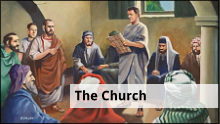
You’ve heard the expression “Rome wasn’t built in a day”, well neither was anything else in the ancient world. Take the Great Pyramid of Egypt for example, one of the seven wonders of the ancient world (and the only one still standing) took around 20 years to build. The Great Wall of China was built on and off over 2,100 years. What’s my point? The “Great” things of the world take time to build and the Church is no different.
